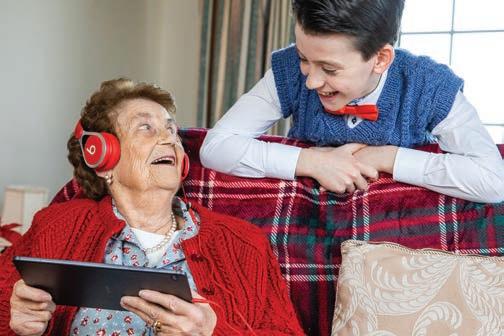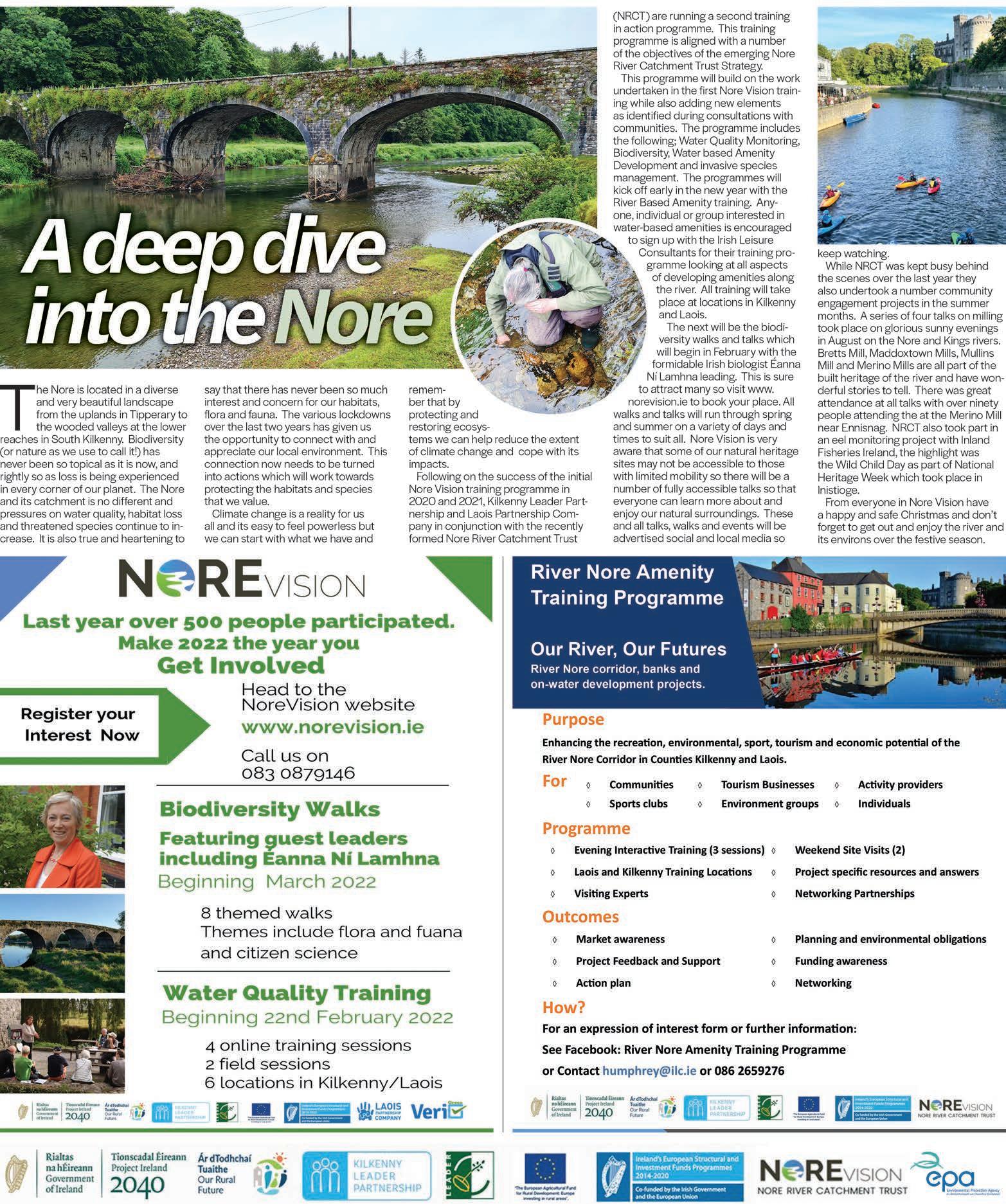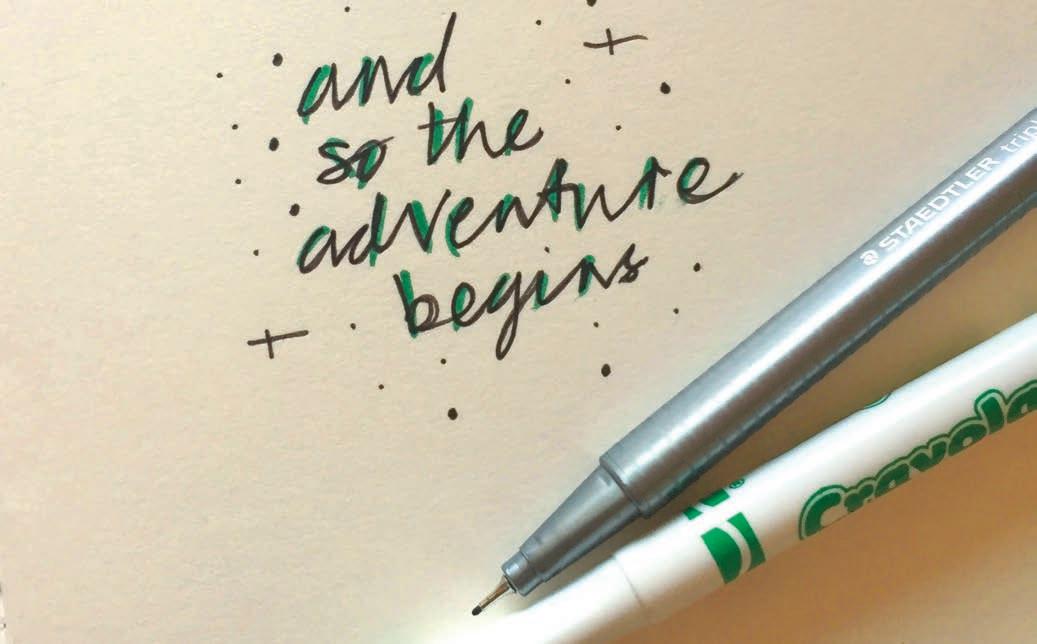
12 minute read
Marianne Heron
Are New Year resolutions a mission impossible?
AS I SEE IT
Advertisement
MARIANNE HERON
FOR several years now the only New Year resolution I have made is not to make one. It’s not that I can’t see the appeal of starting the year full of good intentions. It’s all to do with making a fresh start once the Christmas festivities are over and focussing on the things that need attention in your life, a bit like starting a clean, new copy book. e trouble is, though, that the shine on that newly minted promise to yourself wears o quickly when the resolution falls by the wayside as it generally does. So why does this happen? Before you start to beat yourself up for lack of will power, it’s good to recognise the difference between a goal and a resolution. A goal is something concrete with an aim that will bene t you, that has a measurable result, a time frame and de nite steps that you need to take to achieve it. A resolution is much less de ned and is often just a u y aspiration — like wanting to lose weight or get t — likely to get lost in the jungle of life. ere are some things that make it far more likely that you will succeed in reaching your target. Trick number one is to make a plan of action for achieving your goal. It makes it easier to manage, too, if you chunk it down into di erent steps, especially if it’s a challenging goal.
Writing your plan down is a surprisingly e ective way to make it stick. A survey carried out at Yale University came up with an interesting fact. Students where asked questions about various things like whether or not they set goals; only 10% had but they were 90% more successful than those who simply had aspirations. Among those who had goals the three percent who wrote their goals down were 90% more successful than the rest.
Why is writing your goal down so e ective? It may be to do with having recorded a very de nite destination and route like a map. As Yogi Berra observed: “If you don’t know where you are going you end up someplace else.”
Visualisation adds another dimension to making what you have in mind come true. Sports coaches and athletes now recognise the bene ts of mental rehearsal. inking through the act without doing it physically helps both for skill learning and sport where it has been found to help motivation and reduce anxiety. If you think you can do it you are more likely to do it. Could be why cookery programmes have such an appeal; if you see someone else doing whipping up a delicious dish successfully you are encouraged to believe you can do so, too, although my cakes never turn out quite like Mary Berry’s.
Having a gym buddy, a running mate or joining a group not only makes some goals like tness and weight loss more fun, adding an element of competition, but it makes you accountable to others. It can also help avoid excuses and giving up, say when you have made a mistake (rather than calling it a learning experience) or procrastinating, (putting stu o can involve more mental stress than actually doing the thing! )
When starting out in pursuit of a goal I like to remember that bit in Alice In Wonderland where Alice asks the Cheshire Cat which way she should go and the cat says that it depends where she wants to go. Alice doesn’t know so the cat replies, then it doesn’t matter which way you go. If you know where you want to go with your goal there’s a much better chance of getting there.
Good luck!
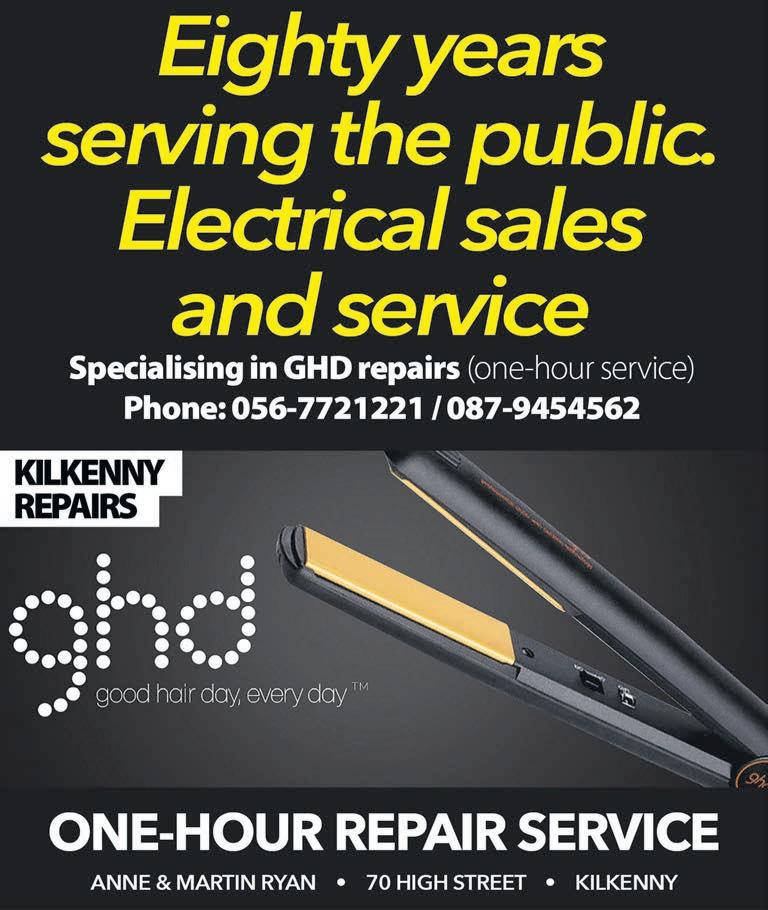
How hypnotherapy can benefit you!
ANDREW MCDONALD HYPNOTHERAPIST
HYPNOTHERAPY is powerful. Don’t take my word for it, research it online for yourself. ere is a huge amount of good scienti c evidence to demonstrate the e ectiveness of hypnosis as a treatment.
Actually, perhaps a better way of putting it would be the subconscious mind is positively herculean compared to the conscious state. By communicating with the former, hypnotherapy uses your own incredible strength and willpower to bring positive changes which quite literally change your life.
Maybe the strongest example is when someone is su ering an addiction. Addictive behaviour is habitual. Smoking tobacco, drinking, at least if you struggle with alcohol, overeating the wrong foods, very few of these involve conscious e ort. If you’re a smoker, I guarantee you’ve experienced the phenomena of nding yourself sucking on a cigarette and not knowing how it found its way to your mouth. e same with supping on a pint or gorging on chocolate. at’s because your subconscious mind takes over when performing habits and that is a major reason why it’s so hard to stop. Your conscious wants to quit but hasn’t communicated this desire to your subconscious. Hypnotherapy is arguably the most e ective way of doing that, getting the two parts of your mind to talk to each other so what you consciously want to do becomes subconscious habit. From this idea we can easily understand why hypnotherapy is also hugely bene cial to people who want to lose weight, and perhaps most importantly keep those pounds o . Eating is habitual. Consuming poor quality, fattening foods is a habit. Your conscious mind might want you to be slimmer but if your subconscious doesn’t know this, you’re basically going to war with yourself. e same concept applies to exercise. Finding the motivation to start running, cycling, swimming or doing another vigorous activity and the commitment to keep going is tough. Particularly in this country where we’re blessed with some pretty miserable weather at times. Again, you need your subconscious ghting in your corner and, to do this, you need to talk to it.
Other areas of life which people struggle with are also habitual. Stress, although often caused by external factors, is something we can learn to deal with more e ectively. Typically, this involves developing more objective thinking patterns. e problem is we need to do this habitually, automatically, for it to have the best e ect. Sleep is the same. e way we view bedtime, how we prepare ourselves for bed and our thought processes when our heads are on the pillow are deeply habitual.
Hypnotherapy o ers huge life bene ts in a massive variety of ways. Far too many to list here. e most important thing to know is that it works by getting your conscious mind to communicate with your far more powerful subconscious. From there, desires become habits and change is then natural and in nitely easier. Your subconscious wants to help you, you just need to tell it what you want.


IN recent months, a six-hour Facebook outage provided an interesting example of our complex relationship with social media platforms and the hugely powerful companies behind them. Users the world over were up in arms and their frustrations over the lack of access (and what might have caused it), made global headline news.
One thing was clear: we spend far more time posting, checking and scrolling on those platforms than most of us would like to admit.
Social media and gaming platforms are a vastly powerful industry and we, their users, are very invested in them, in terms of our time and attention. ey are a source of entertainment, fun and are an important element of our socialising. e Child Mind Institute’s 2019 ‘Children’s Mental Health Report’ found that 81% of teens surveyed said that social media makes them feel more connected to their friends. at was before COVID lockdowns signi cantly increased our reliance on it.
But there is a darker side to all of this too, as the recent Facebook whistleblower revelations about negative impacts on children’s wellbeing, highlighted. ese revelations followed the publication of joint research carried out by the 5Rights Foundation, which showed how the design of these platforms is putting children at risk.
It provided evidence that design features are deliberately developed to increase time spent online, to target child accounts with harmful content (such as pornography and proanorexia material) and to deliver to them unsolicited messages and requests from strangers.
Who is accountable when things go wrong for a child, or indeed any user, on an online platform? Is it the parents who let their children use these services without adequate supervision and sometimes before they are of the right age? e Government? e big tech companies that own them? Well, as is often the case, the responsibility lies with all of the above. But one of those groups is pro ting far more from children being online than the others.
As it stands, all of the big tech companies have ‘community standards’ in place, which are essentially the acceptable codes of behaviour on their platforms. at’s great in practice but the policing of such standards has proven to be inconsistent and existing safeguards are possible to circumnavigate.
To my mind, this means that these companies essentially dance to their own tune. at has got to change. It’s at least two years since our own Government said that the “era of self-regulation is over” (2019) and yet, that model is the one that persists.
Change, however, is on the horizon. We have the eagerly anticipated ‘Online Safety & Media Regulation’ bill coming down the tracks. Having completed its extensive pre-legislative scrutiny, the Joint Oireachtas Committee has published its report and the ndings are encouraging. As members of the Children’s Rights Alliance ‘123 Online Safety Campaign’ we have been lobbying for signi cant changes that will serve to substantially strengthen what is essentially a weak bill. Crucially, the recommendations include the setting up of an individual complaints mechanism, which will provide an important safety net for those users who have incurred harm online, speci cally in the event that the online services have failed to provide that support themselves.
As part of its online safety campaign, the Children’s Rights Alliance has sought to ask the public what they expect from this upcoming bill and the results were encouraging to those of us that want to see more responsibility placed on the shoulders of the online platforms in terms of harmful content that they host.
A thousand adults were surveyed and the vast majority (91%) felt that big tech companies use their power and in uence in a way that bene ts themselves (and this research was gathered before the Wall Street Journal got their scoop from Frances Haughen). Up to 69% felt that they should deliberately block children from accessing content that could harm them.
A total of 72% felt that penalties should be introduced that would encourage social media companies to stop harmful or illegal content on their platforms and 70% felt that the Government should introduce laws that hold big tech and social media companies responsible for the content they allow on their platforms.
And with regards to that important question of whether or not the proposed Online Safety Commissioner should have the powers to investigate complaints made by the public when social media companies fail to uphold the rights of the individual, there was also clear support from the public with 77% of those surveyed in favour and a further 78% in favour of nancial penalties for those companies that fail to comply.
As host to a number of the EMEA headquarters for larger platforms like Google, Facebook, TikTok and Twitter, Ireland should be leading the way. Regulation is coming and is clearly much needed, but we must make sure that accountability is put in all the right places because at the end of the day, only then will it become the vital safety net it needs to be. www.cybersafekids.ie
The Dark Side of the internet
Alex Cooney, Co-founder and CEO of CyberSafeKids, on online regulation and why we must make sure that accountability is put in the right places
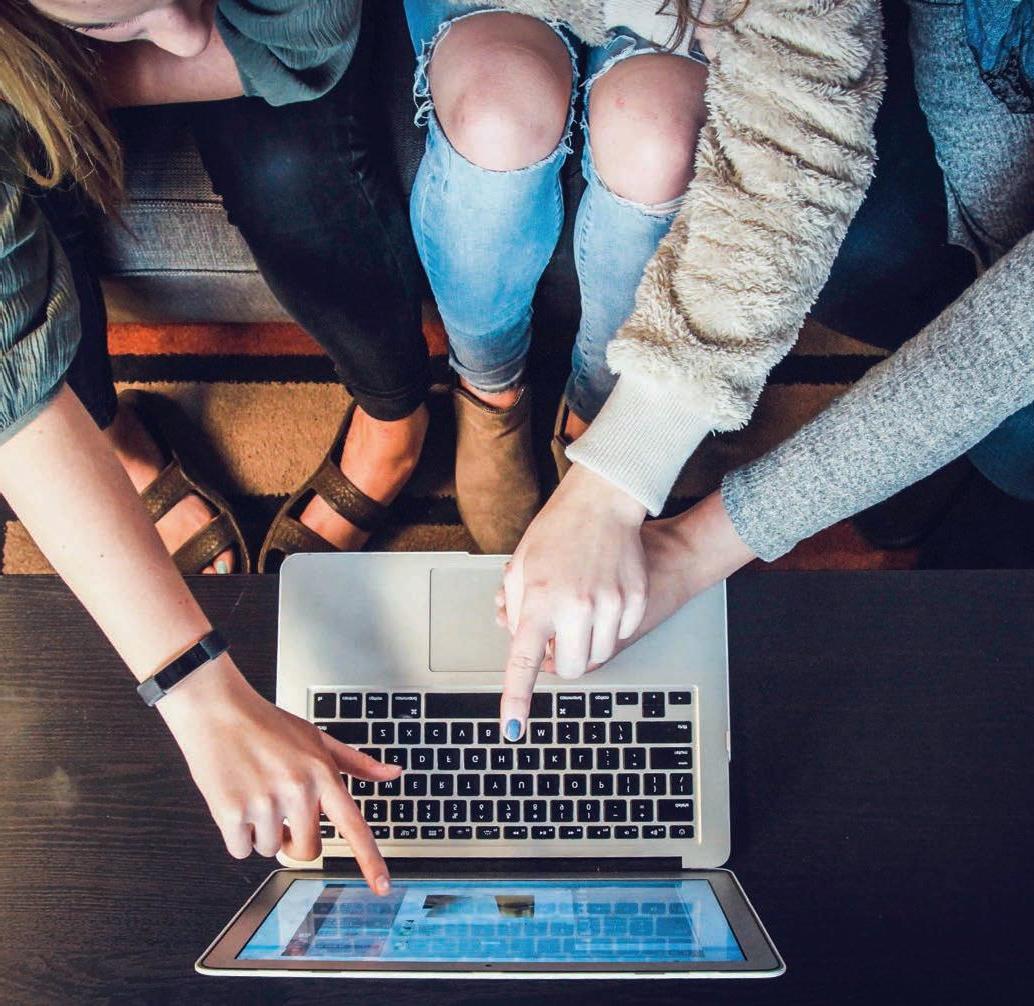
Hi Digital platform and digital literacy awareness
THE importance of digital literacy has become very apparent in the past two years and according to research conducted by Vodafone Ireland Foundation, a quarter (25%) of the Irish public say their older relatives’ digital skills are poor or very poor. It was also found that 79% agreed they would feel more connected to their older relatives if their digital skills were improved.
Hi Digital, developed by Vodafone Ireland Foundation, alongside Active Retirement Ireland and ALONE, is an online learning platform aimed at those over the age of 65. Hi Digital provides bite-size lessons organised around key digi-
In Ireland, digital literacy levels of those over 65 years old are among the lowest in Europe. e pandemic has exacerbated this problem as it saw more communities and services move online at an unprecedented rate. As well as an ability to connect to essential services, a lack of digital skills can lead to isolation. A total of 79% of those polled agreed they would feel more connected to their older relatives if they had the ability to use digital technology such as a smartphone or tablet, allowing generations to connect and share experiences. e Hi Digital platform has been created for beginners and supports self-learners as well as those helping older people get online through its mentor guide. With 86% of those surveyed willing to mentor an older relative or friend on digital skills, the festive season marks the perfect time to make a start as families gather over the coming weeks.
Helping raise awareness of Hi Digital this Christmas are Pat Corcoran, a ectionately known as Nanny Pat, and Tom Cullen (pictured) who captured the nations hearts during their appearance on e Late Late Toy Show in 2019. e following year, after the arrival of the Covid-19 pandemic, Nanny Pat joined Ryan Tubridy once more on the Late Late Show via Skype, much to Tom’s surprise.
Speaking on the initiative, Nanny Pat said “It is easy to become isolated during these di cult times and being able to connect with my family and friends online has made a huge di erence. Getting better with technology can seem like a big hill to climb but learning skills bit by bit has helped me and of course, my family are always here to support whenever they can. Hi Digital is a great initiative.”
People can participate in the programme online at HiDigital.ie with further face-to-face training to be rolled out next year.
